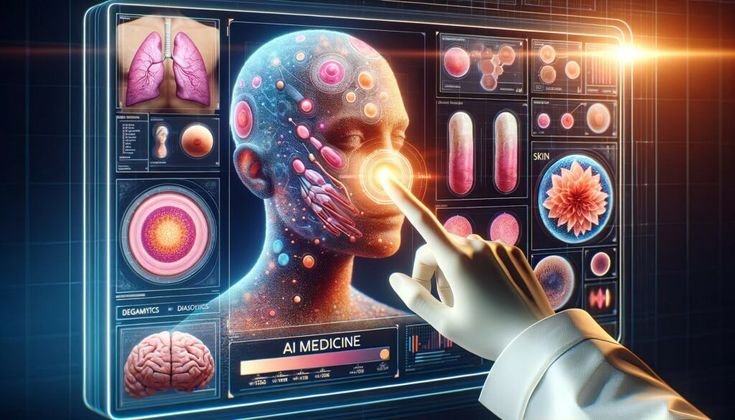
Pharmaceutical marketing has changed more in the last year than in the previous decade. My experience as a pharmaceutical marketing professional shows how generative AI alters the map of our industry. This technology impacts everything from content creation to regulatory compliance.
Modern pharmaceutical industry marketing needs more than traditional approaches to stay competitive. AI-powered tools help pharma digital marketing teams work with better personalization. Many organizations find implementing these technologies challenging while retaining control over compliance and quality standards.
This piece explains how generative AI will reshape pharmaceutical marketing in 2024. You will learn about building AI-ready marketing teams and navigating regulatory requirements. The information provides a practical roadmap that helps your organization adopt AI effectively.
Understanding the AI Revolution in pharmaceutical marketing
Pharmaceutical marketing investments have reached new heights. The on sales and marketing in 2020. My deep involvement in the industry shows this represents a major change in our approach to market involvement and customer outreach. The top 10 pharma companies spent $137 billion
Current State of Pharmaceutical Marketing
The pharmaceutical industry faces pressure from the rising need for customized medicine and complex regulations. Traditional marketing approaches no longer work effectively because healthcare providers (HCPs) and patients just need more relevant content. Targeted drugs have made each patient more valuable, which makes precise marketing crucial.
How Generative AI is Changing the Game
Generative AI’s growth in healthcare outpaces other industries. The. McKinsey’s analysis shows this technology could for the pharma and medical product industries. compound annual growth rate will reach 85% through 2027generate between $60-110 billion annually in economic value
These changes show up in several ways:
- Content creation automation reduces costs by 30-50%
- Market insights and trends improve by up to 30%
- 45% of pharmaceutical companies now use AI tools for compliance tasks
Key Technologies and Applications
Our experience shows meaningful AI applications center on customization and efficiency. The technology analyzes data from patient records, social media interactions, and online behaviors to create detailed customer personas.
Generative AI brings exciting changes to content creation. NLP tools now help draft educational articles and social media posts while meeting industry regulations. Pfizer’s generative AI platform Charlie, to name just one example, focuses on digital media, emails, and medical articles.
AI’s processing of structured and unstructured data gives us new analytical insights into market dynamics. Companies can make smarter decisions about resources, advertising spending, and product positioning. The technology excels at analyzing historical sales data, patient demographics, and social media trends to predict market movements.
This transformation stands out because AI knows how to customize at scale. Healthcare providers can now offer individual concierge-like experiences throughout the patient’s treatment. This level of customization and AI’s analytical power reshapes the scene of pharmaceutical marketing practices.
Building an AI-Ready Marketing Organization
My leadership experience in pharmaceutical marketing’s AI transformations shows that success starts with a full organizational assessment. Let me share how we can build an AI-ready marketing organization ready to tackle future challenges.
Assessing Your Organization’s AI Readiness
Successful AI implementation needs a complete evaluation of your current capabilities. McKinsey’s research reveals that because of poor change management, not technical issues. Your organization needs evaluation from multiple angles – technology infrastructure, data governance, and team capabilities.70% of digital transformations fail
A readiness assessment should focus on these vital areas:
- Data infrastructure and governance
- Current technological capabilities
- Team skill levels and training needs
- Regulatory compliance frameworks
- Change management readiness
Required Skills and Capabilities
Building an AI-ready marketing organization demands both technical and soft skills. Our experience proves that strong data analysis capabilities create the foundation. Teams must collect, analyze, and interpret data from prescription records, clinical trials, and patient feedback effectively.
With data science, AI, and pharmaceutical expertise become vital. This group serves as the backbone of AI initiatives and streamlines implementation across departments. central steering group
Change Management Strategies

Change management needs careful coordination when implementing AI. BCG’s analysis shows that depending on effective change management 70% of the value derived from generative AI
Success depends on these essential elements:
Real C-suite commitment comes first. Leaders must prioritize AI initiatives and allocate enough resources. This commitment should extend beyond verbal support to include actual resources and visible championing of AI projects.
A well-planned communication strategy makes the difference. Effective plans do more than just announce changes. They help team members visualize their place in the transformation and understand their role clearly.
Training and skill development deserve significant investment. Successful implementations help people apply AI to their daily work instead of just teaching technical skills. This approach helps AI enhance possibilities rather than just automating existing processes.
Implementing AI in Content Creation
Using AI for content creation has changed the game in our pharmaceutical marketing strategy. I’ve watched this technology transform our approach to creating and managing marketing materials while keeping our compliance standards intact.
Content Generation Best Practices
Success in AI content generation comes from a well-laid-out approach. McKinsey’s analysis shows that using AI in pharma can. Here are the key practices that work best: reduce content creation costs by 30-50%
- Strategic Content Planning
- Define clear content objectives
- Establish content validation workflows
- Create detailed prompt libraries
- Implement quality control checkpoints
Ensuring Medical Accuracy
Medical accuracy remains our top priority. Our experience shows that AI needs a resilient validation process. According to recent studies, ChatGPT is without specialized training. But human oversight is vital – we use a three-layer verification process: performed at or near the passing threshold for the United States Medical Licensing Exam
- AI-powered original screening
- Subject matter expert review
- Final compliance check
AI helps streamline the Medical Legal Review (MLR) process and cuts approval times from the current industry average of 21-56 days. Our AI-assisted reviews have increased efficiency by up to 40%.
Maintaining Brand Voice
Creating a consistent brand voice across AI-generated content presents a big challenge. Research shows that 71% of consumers expect personalized communications from companies they interact with. We’ve built a systematic approach to ensure brand consistency.
Success comes from detailed documentation of your brand voice and precise AI tool training. AI’s ability to analyze big datasets helps it understand your brand’s voice in different contexts. When we feed our brand voice guidelines, do’s and don’ts, and successful content examples to the AI tool, it creates content that matches our brand’s voice across the enterprise.
The exciting part is how we now use AI to analyze our most successful content pieces to understand what works. We identify patterns in language, tone, and style that appeal to our audience. This lets us copy these success factors in future content while maintaining complete medical accuracy.
Note that in pharmaceutical marketing practices, we’re not replacing human creativity – we’re boosting it. AI in our content workflow removes uncertainty around brand voice compliance and lets our teams focus on innovative storytelling within our brand identity framework.
Navigating Compliance and Risk Management

The integration of AI into pharmaceutical marketing strategies has made compliance and risk management more critical than ever. FDA reports showing a notable rise in data integrity warning letters from 2005 to 2017, . This increase highlights our growing regulatory challenges. averaging 12 warning letters per year
Regulatory Considerations
Regulatory frameworks in pharmaceutical industry marketing practices have evolved faster. The FDA has stepped up its efforts to create an agile regulatory ecosystem that aids state-of-the-art solutions while protecting public health. FDA’s recent initiatives require different federal agencies to adopt specific AI application safeguards by December 2024
Key compliance areas we monitor include:
- Data integrity maintenance
- Documentation requirements
- Validation protocols
- Risk assessment procedures
Data Privacy and Security
Data privacy has grown more complex in pharma digital marketing. Health data’s sensitive nature, including medical histories and treatment outcomes, receives special emphasis from WHO. Our resilient data protection measures line up with HIPAA in the U.S. and GDPR in Europe
Data privacy works best with a three-pronged approach:
- Systematic data collection protocols
- Secure transfer mechanisms
- Advanced encryption systems
Building Compliant AI Systems
Our compliant AI systems focus on the “trust trinity”: transparency, accountability, and validation. The European Medicines Agency (EMA) prefers transparent AI systems, and we’ve shaped our development processes therefore.
AI compliance needs continuous monitoring and improvement. Our systems track risks and safety according to regulatory guidelines. This strategy helps us spot potential safety risks early and take timely action to prevent widespread adverse events.
Data integrity stands as a vital component of our process. The Medicines and Healthcare Products Regulatory Agency (MHRA) defines it as maintaining accuracy, consistency, and completeness of data over time. Our sophisticated algorithms and machine learning models handle massive data sets more accurately than traditional methods.
Regular security checks identify potential vulnerabilities in successful implementations. This proactive strategy helps us stay compliant while redefining the limits of pharmaceutical marketing possibilities. Healthcare-specific AI implementation has reduced adverse events by a lot while accepting new ideas in our marketing approaches.
Transforming the Medical Legal Review Process
The medical legal review process has always slowed down pharmaceutical marketing. I’m excited to share how AI integration is revolutionizing this vital aspect of our work. Our team has seen a complete transformation in handling regulatory compliance and content approval.
AI-Assisted Review Workflows
My experience with AI-assisted review workflows shows remarkable improvements in efficiency. Asset approval in the traditional MLR process takes. Now we achieve much faster turnaround times. Our sophisticated system combines optical character recognition (OCR), natural language processing (NLP), and large language models (LLMs) Between 21 to 56 days
Our new workflow has:
- Automated pre-screening of materials
- Smart document routing
- Up-to-the-minute compliance checking
- Intelligent version control
Automation Opportunities
Automation opens new doors to streamline pharmaceutical marketing practices. Our AI-powered workflows process claims. This has transformed pharmaceutical industry marketing in these key areas:up to 70% faster
- Document Processing
- Automatic conversion of physical documents to digital text
- Smart categorization of content
- Intelligent data extraction
- Automated reference checking
AI conducts initial reviews to enable what I call a “multi-speed approval system.” This system fast-tracks compliant content while flagging potential issues that need detailed review.
Quality Control Measures
Our integrated approach to quality control maintains high standards while speeding up the review process. AI helps create custom summaries and chronologies that highlight key details for attorneys and regulatory teams.
Quality control in pharma digital marketing works best with a three-tiered approach:
- Automated Pre-screening: AI systems conduct initial compliance checks
- Expert Review: Subject matter experts confirm AI findings
- Final Verification: Quality assurance teams ensure complete accuracy
We use and automatically redraft when needed. This helps maintain consistency in our pharmaceutical marketing materials while meeting regulatory requirements. sophisticated algorithms that detect anomalies
The AI’s ability to learn from past approvals makes this transformation powerful. Our systems analyze previous decisions and outcomes to predict compliance issues more accurately. This predictive capability reduces review cycles while maintaining high standards of accuracy and compliance.
Empowering Marketing Teams with AI Tools
Our pharmaceutical marketing teams have seen remarkable changes since adopting AI technologies. Marketing executives now rely on AI-driven insights to make informed decisions. The results show a 15% boost in customer participation.20% increase in efficiency
Training and Skill Development
Successful AI implementation needs more than technical training. Teams must learn to apply these technologies in their daily work and adopt new workflows.
Our detailed training approach has:
- Data analysis and interpretation skills
- AI tool proficiency development
- Digital marketing techniques
- Continuous learning programs
- Crisis management capabilities
Workflow Integration
Successful workflow integration depends on creating operational guardrails and proper internal governance. AI can .improve speed to market by 50%increase content delivery volume by 25% to 40%
The integration process follows these critical steps:
- Assessment of existing workflows
- Identification of automation opportunities
- Implementation of AI-powered tools
- Establishment of feedback loops
- Continuous optimization
AI enables new workflows in pharmaceutical industry marketing. To cite an instance, AI provides immediate access to information on any drug in the portfolio and answers medical questions with concise summaries in plain language.
Performance Monitoring
We developed sophisticated approaches to track how AI affects our pharmaceutical marketing practices. Companies using AI for marketing campaigns show notable improvements in efficiency and customer engagement.
Effective performance monitoring needs live tracking of multiple metrics. AI-powered social media monitoring tools detect potential PR crises or negative sentiment spikes immediately. This helps teams manage crises proactively and reshapes the scene of risk management in pharma digital marketing.
AI provides unmatched insights into sales, marketing, and market access using market performance data. Teams track campaign success, measure ROI, and are quick to make adjustments. This leads to better decision-making processes.
The marketing workforce will soon handle content and insights at higher speeds. This offers potential efficiency gains and effectiveness improvements at brand level. Our careful monitoring and optimization show unprecedented improvements in delivering customized experiences while meeting compliance standards.
Managing the AI Implementation Journey
AI implementation in pharmaceutical marketing needs a perfect mix of ambition and practicality. My time helping many organizations through this change has taught me that success comes down to good planning and realistic expectations.
Setting Realistic Timelines
The pharmaceutical industry cannot afford to rush AI implementation as it might get pricey. McKinsey’s research shows that not because of technical problems but due to poor change management. A step-by-step approach works best. Teams adapt better while keeping their momentum.70% of digital transformations fail
These factors determine the success of implementation timelines:
- Data preparation and infrastructure setup
- Team training and skill development
- Regulatory compliance integration
- Testing and validation periods
- Scaling and optimization phases
Resource Allocation
Proper resource allocation is vital for pharmaceutical marketing transformations. Running too many pilot projects without a clear scaling plan creates problems. A centralized funding approach for AI initiatives works better. This ensures projects benefit the entire enterprise instead of business units funding their isolated experiments.
The implementation follows these steps:
- Establish a central coordination team
- Allocate resources based on strategic priorities
- Create dedicated training budgets
- Invest in necessary infrastructure
- Set aside funds for ongoing optimization
Finding the right mix between small-scale projects and bigger transformational initiatives matters most. Organizations succeed when they pick projects that meet long-term goals while leaving room to experiment.
Measuring Progress

Pharmaceutical digital marketing needs both numbers and observations to measure AI implementation progress. AI boosts clinical trial processes and predictive modeling. This leads to 70% cost savings per trial and 80% shorter timelines.
Successful measurement frameworks must track several areas:
Technical Implementation: System performance, data quality, and integration metrics need monitoring. This ensures AI solutions work at their best and deliver expected results.
Business Impact: Key performance indicators show how well our AI initiatives work. We track engagement rates, conversion rates, and ROI across pharmaceutical marketing practices.
User Adoption: Regular team capability assessments show how well people use AI tools. This matters because studies indicate that 65% of respondents believe AI will affect manufacturing and supply chain management in pharmaceuticals the most.
This experience brings unique challenges as we balance quick wins with long-term transformation. AI can cut drug development timelines from 5-6 years to just one year. Yet, organizational transformation needs patience and consistent effort.
Good resource allocation and realistic timelines bring remarkable improvements in pharmaceutical marketing capabilities. Flexibility matters while focusing on long-term strategic goals. Strong measurement systems help adjust our approach based on ground results and new opportunities.
Future-Proofing Your AI Marketing Strategy
The pharmaceutical marketing landscape amazes me with its AI technologies that evolve faster each day. Generative AI will outpace growth in healthcare compared to other sectors, showing a remarkable through 2027. This explosive growth means we need smart strategies to stay ahead in this ever-changing industry. compound annual growth rate of 85%
Emerging Technologies
My years of leading digital transformations have taught me that keeping up with new technologies makes a significant difference in pharmaceutical marketing success. The McKinsey Global Institute projects AI could add to pharma and medical products industries.$60-110 billion annually
These breakthrough technologies have altered the map of our industry:
- Large Language Models (LLMs) to boost content generation
- Predictive analytics to forecast market trends
- Computer vision to optimize visual content
- Natural Language Processing to analyze customer interactions
- Quantum computing applications to process complex data
Scalability Considerations
Success in scaling AI for pharmaceutical marketing needs reliable foundations. Our research proves companies can reach markets 50% faster and deliver 25-40% more content through smart AI deployment.
These essential steps lead to successful scaling:
- Establish data quality standards and governance
- Build flexible infrastructure that can grow
- Implement automated monitoring systems
- Create cross-functional feedback loops
- Develop clear escalation protocols
Data quality becomes even more critical as you scale. Poor or inconsistent data leads to flawed AI outputs and bad decisions. This matters beyond efficiency in pharma digital marketing – it affects compliance and trust.
Continuous Improvement
Continuous improvement serves as the lifeblood of any successful AI strategy. Studies show 98% of business leaders believe companies should explore AI and machine learning to accelerate growth. This matches what I’ve seen firsthand – companies that don’t move forward fall behind.
Three key elements drive effective continuous improvement:
Performance Monitoring: Our KPI tracking systems measure both technical performance and business effects. This helps us spot optimization opportunities and make data-driven decisions.
Feedback Integration: Clear communication channels across our GTM teams help insights flow from every part of the organization into our improvement cycle. This teamwork prevents silos and waste.
Adaptive Learning: Our AI systems learn and evolve with each interaction. This approach improves accuracy and uncovers new opportunities in our pharmaceutical marketing strategies.
AI’s power to predict customer behavior and shape strategies excites me most. We analyze big data sets through AI-driven predictive analytics to spot trends and patterns. This creates marketing strategies that strike a chord with customers.
The most successful organizations see AI as a dynamic tool needing constant refinement. Purpose-built accessible interfaces help us track KPIs and understand where we make an impact.
Pharmaceutical marketing’s future depends on how well we adapt to these technologies. Smart attention to new trends, careful scaling strategies, and dedication to improvement create lasting AI marketing strategies that deliver value.
Conclusion
Generative AI has altered the pharmaceutical marketing map faster than any previous technology. My hands-on work implementing AI in organizations of all sizes shows its power to create unprecedented opportunities for personalization, efficiency, and compliance. The projected demonstrates we’ve barely touched AI’s potential in our industry.85% growth rate through 2027
Companies need more than technological adoption to succeed with AI. They must build capable teams, establish resilient processes, and maintain steadfast dedication to compliance. My collaboration with pharmaceutical companies reveals that organizations achieve the best results when they focus equally on people, processes, and technology.
The next few years will separate pharmaceutical companies that lead the AI revolution from those that fall behind. Organizations investing in AI capabilities now, while maintaining strong regulatory compliance and risk management practices, will secure the most important competitive advantages. AI implementation is not a destination but an ongoing experience of optimization and improvement.
FAQs
Q1. How is generative AI transforming pharmaceutical marketing? Generative AI is revolutionizing pharmaceutical marketing by enabling personalized content creation, improving efficiency in regulatory compliance, and providing deep insights from vast amounts of data. It’s helping companies reduce content creation costs, streamline the medical legal review process, and deliver more targeted marketing campaigns.
Q2. What are the key benefits of implementing AI in pharma marketing? The main benefits include increased speed to market, improved content delivery volume, enhanced personalization of marketing efforts, and significant cost savings. AI can reduce drug development timelines, automate competitive research, and provide predictive analytics for market trends, leading to more effective marketing strategies.
Q3. How can pharmaceutical companies ensure compliance when using AI in marketing? Companies can maintain compliance by implementing robust data privacy measures, establishing clear AI governance frameworks, and using AI-assisted review workflows. It’s crucial to have a multi-layered approach including automated pre-screening, expert review, and final verification to ensure all marketing materials meet regulatory standards.
Q4. What skills do marketing teams need to effectively utilize AI in pharma? Marketing teams need a mix of technical and soft skills to leverage AI effectively. This includes data analysis and interpretation skills, proficiency in AI tools, digital marketing techniques, and the ability to apply AI technologies to daily work. Continuous learning programs and crisis management capabilities are also essential.
Q5. How can pharmaceutical companies future-proof their AI marketing strategy? To future-proof their AI marketing strategy, companies should stay informed about emerging technologies, build scalable AI infrastructure, and commit to continuous improvement. This involves establishing data quality standards, implementing performance monitoring systems, and creating adaptive learning processes that evolve with each interaction and market change.



